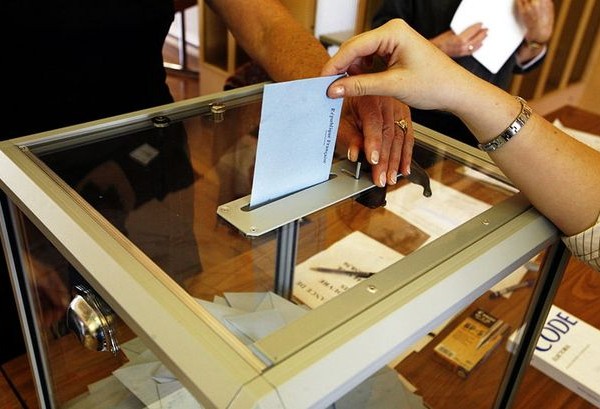The Second Most Important Electoral Reform


Ask a nonvoter why they don't vote, and they will reply something like, "my vote doesn't count anyway, nothing ever changes." And they're right. Either a red or blue duopolist clone will win—guaranteed.
If you're an independent like me, you probably voted against the candidate you didn't want to win because you hated them more than the other candidate. Maybe the candidate you wanted to vote for wasn't even on the ballot, or you couldn't "waste" your vote on a third party candidate, in fear of the one you hate squeaking through.
Voting scholars around the world have essentially reached consensus. Single Mark Ballots are archaic, illogical, and reinforce the false duality that is pervasive in our politics and the media.
The following is from Aaron Hamlin, co-founder of The Center for Election Science on 4/16/2012:
“…Our vote-for-one Plurality Voting system suffocates Independents. Plurality ensures this result by coercing voters away from their honest favorites. No one wants to throw away their only vote on a less-than-viable candidate. And it’s this dishonest voting under Plurality that explains the disconnect with whom we elect.”
A group of election experts from around the world said this in the Declaration of Electoral-Methods Reform Activists (DEMRA)…
“’Vote splitting’ is a key weakness of plurality voting. If there are two similar candidates, their supporters will split their votes between the two. If the opposition concentrates all their votes on a single candidate, that candidate may win, even though either of the similar candidates would have won instead if there had been a one-on-one election. Vote splitting also happens in primary elections and nominating conventions.”
One of the DEMRA signers is, Richard Fobes, author of "Ending The Hidden Unfairness In U.S. Elections" and "The Creative Problem Solver's Toolbox," had this to say on Approval voting…
"…This need is especially important in primary elections because that is where the biggest campaign contributors take advantage of vote splitting if a reform-minded candidate dares to run against a money-backed candidate. Remember that the biggest campaign contributors control both the Republican and Democratic parties, and by controlling the primary elections of both parties they don't have to care whether the Republican or Democrat wins the general election. Most voters, and politicians, are too distracted by the left-versus-right debate to notice where the real control of power occurs, and why it is so easy for moneyed interests to control both parties.”
The following is from the London School of Economics and Political Science annual workshop of Voting Power and Procedures (VPP) when twenty-two voting theory specialists ranked eighteen different voting methods…
“First Past The Post (FPTP) – also known as Plurality Voting – received no votes. Approval Voting won the contest with 15 votes. The Alternative Vote (AV) took second place with 10 votes. For a detailed analysis of the vote, download at http://www.lse.ac.uk/vpp "And the loser is... Plurality Voting", a draft of the paper to be published by Springer in the forthcoming book of the VPP workshop proceedings.”
First passed the post or plurality voting only works well when there are only two choices. We now live in a much more complicated world, and we independents deserve more choices.
Let’s get back to vote splitting. The poster child for this is Ralph Nader. Many believe that progressives wasted their vote on Nader, and Al Gore would have won Florida and therefore the Electoral College if they had not. But, with Approval Voting the vote would not have been wasted.
This knife cuts both ways. Would Bill Clinton have won if fiscally conservative Ross Perot hadn’t pulled votes away from the traditionally conservative Republican George Bush? We'll never know, and we shouldn't have to ask. It's beneath our country's dignity.
Here's how Approval Voting works: a conservative could have voted for Gary Johnson and/or Virgil Goode and/or Mitt Romney. A progressive could have voted for Jill Stein and/or Rocky Anderson and/or Barack Obama.
You vote for who you "approve" of being elected. On aGREATER.US where independents’ opinions are given an equal weight with conservatives’ and liberals’ ratings “Ban Single Mark Ballots” has a significant 83% positive approval rating: certainly sufficient to earn a place in a Constitutional Amendment to reform our restrictive electoral process. Is this reflective of society at large? Additional polling data on Approval Voting versus First Past the Post has yet to surface.
There might even be better voting methods than Approval. These options generally rank the candidates, and while one of these methods may ultimately be a superior voting solution, there is logic to starting with Approval. First, the existing voting hardware and software will work with Approval, so there would be a seamless transition.
Second, it will take some time for the electorate to “get up on the learning curve” of how to use the new method. And third, after the first Presidential election using Approval it is highly probable that third parties will qualify for matching funds because they will have received more than 5% of the votes cast. This should be particularly attractive to Independents, and be the first crack in the duopoly’s stranglehold on the electoral process.
I believe Approval Voting is the second most important electoral reform we can implement, today. The first, I wrote about previously, “The Right To a Fraud-Free Counted Vote.” The time has come for a fundamental shift in power, and this is the necessary second step in; We, the People, taking back our electoral system. I will be writing about a broad range of Clean Elections and Clean Government reforms in the weeks to come.
Would approval voting result in more representative elections?




